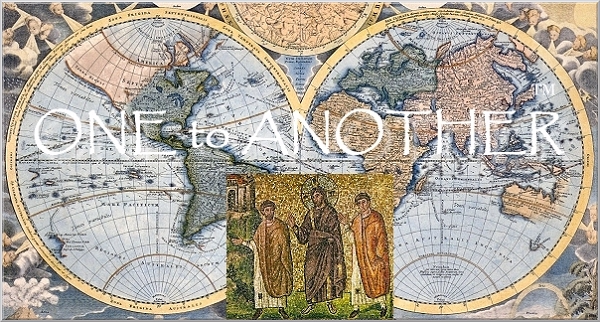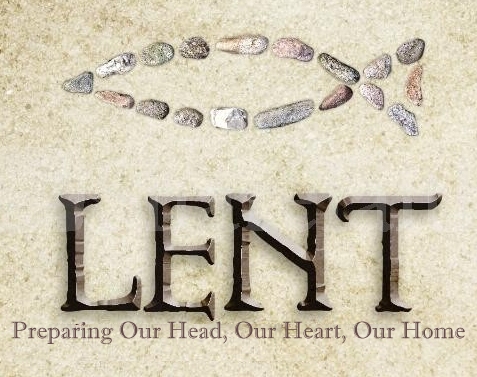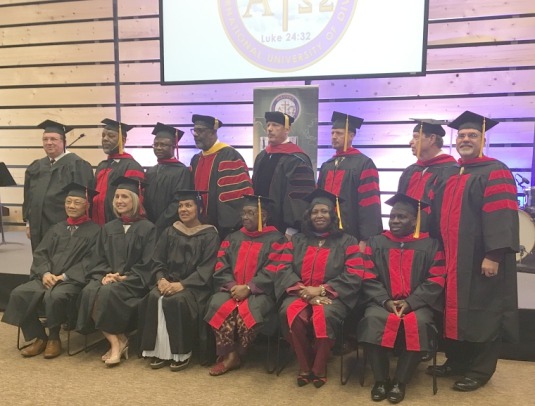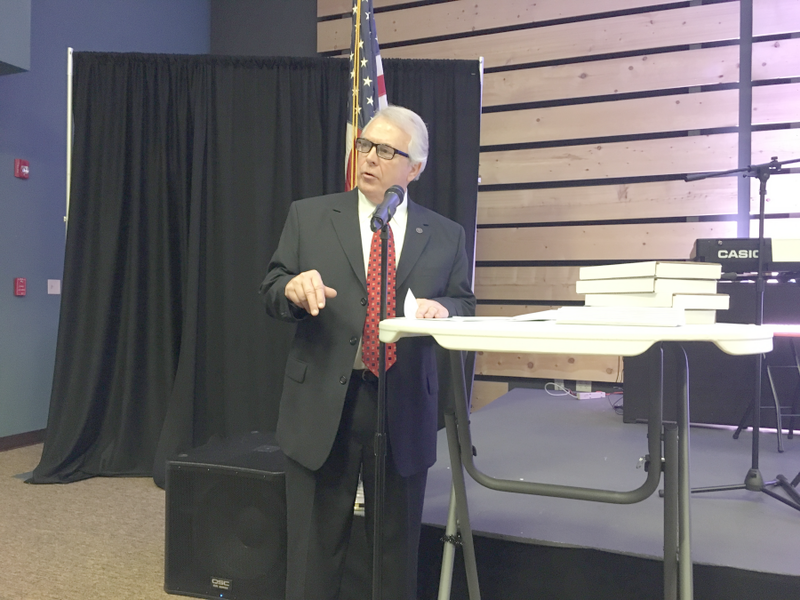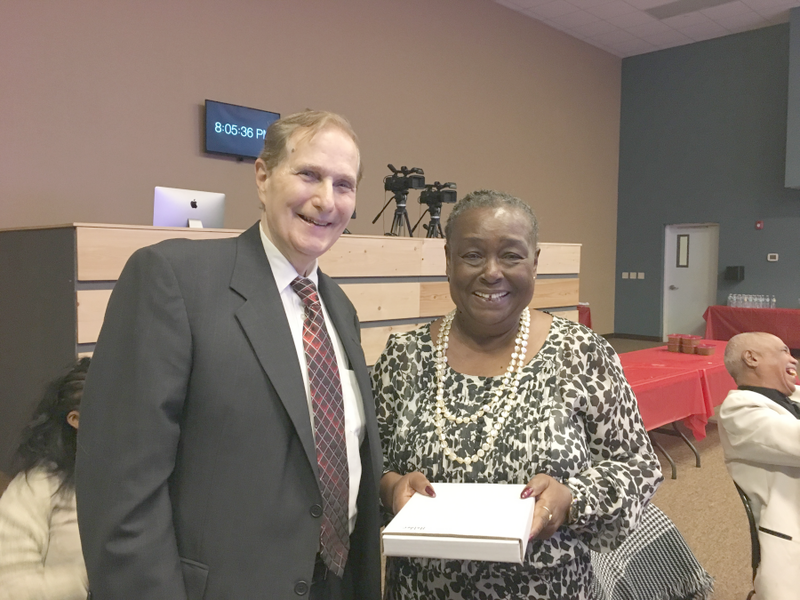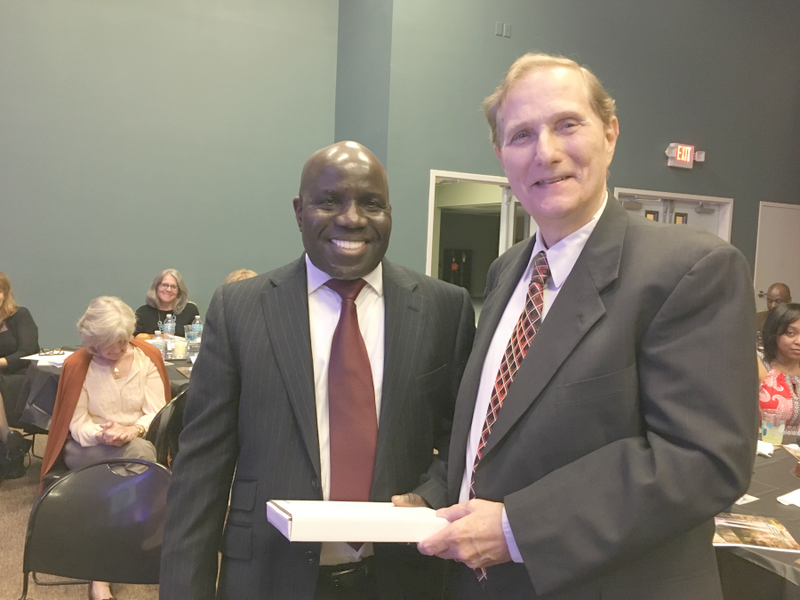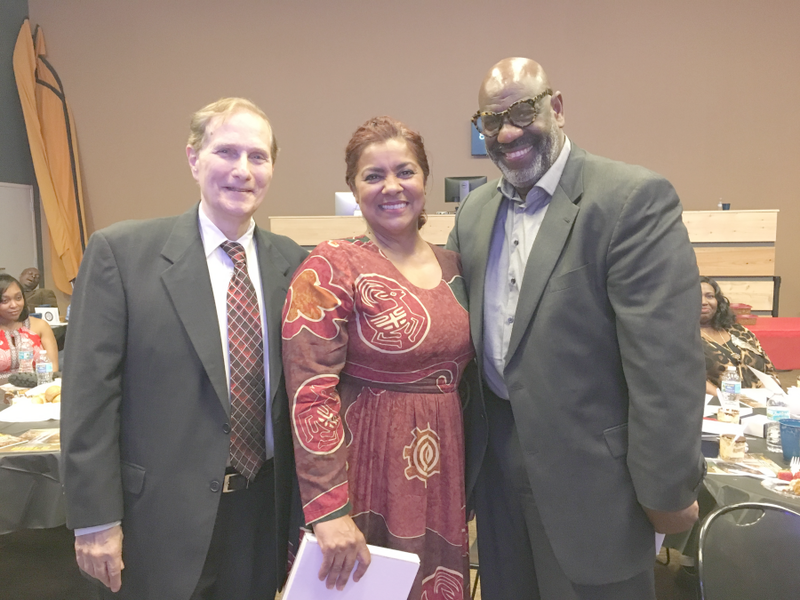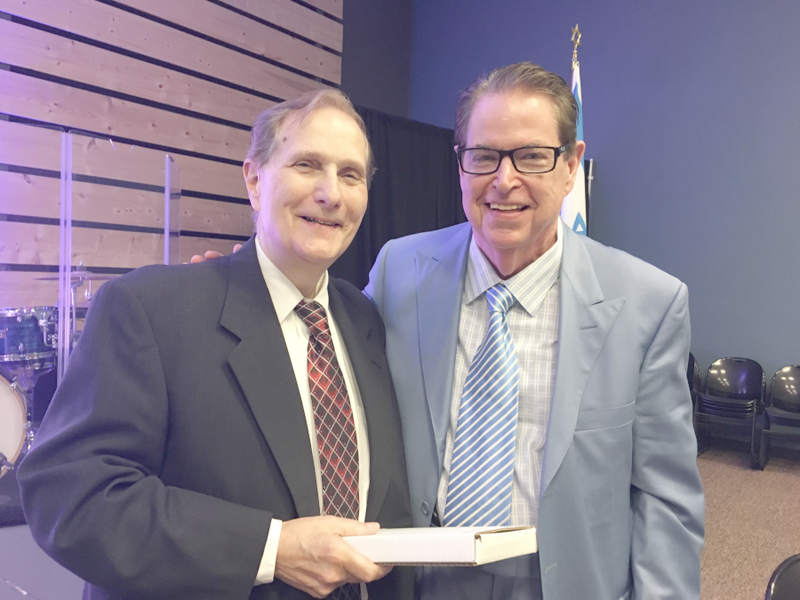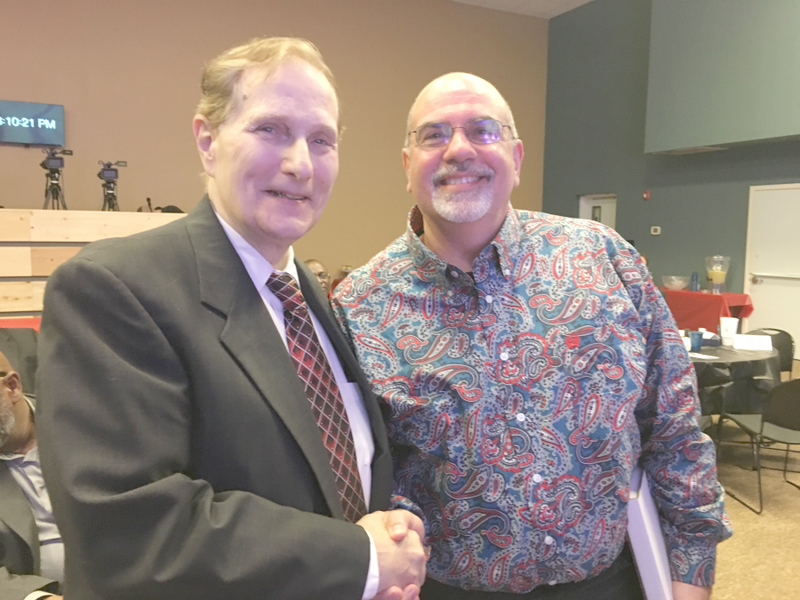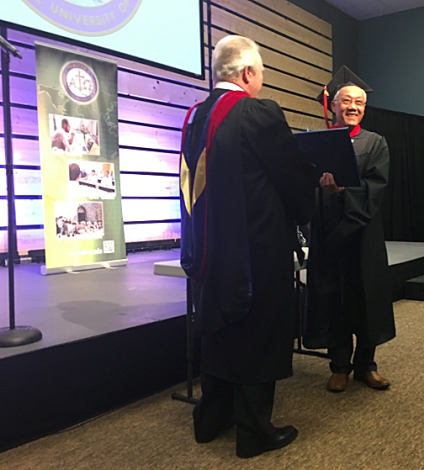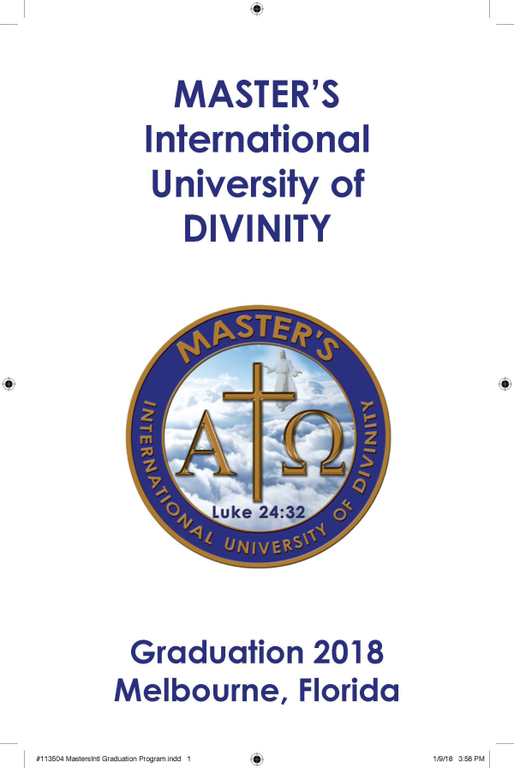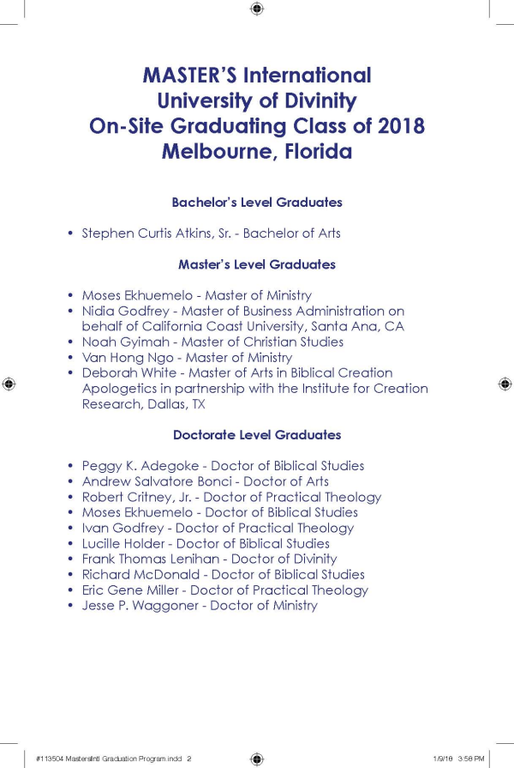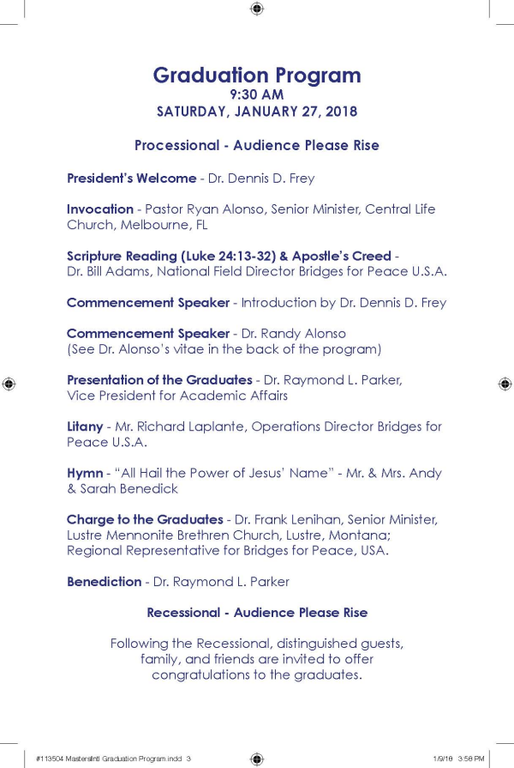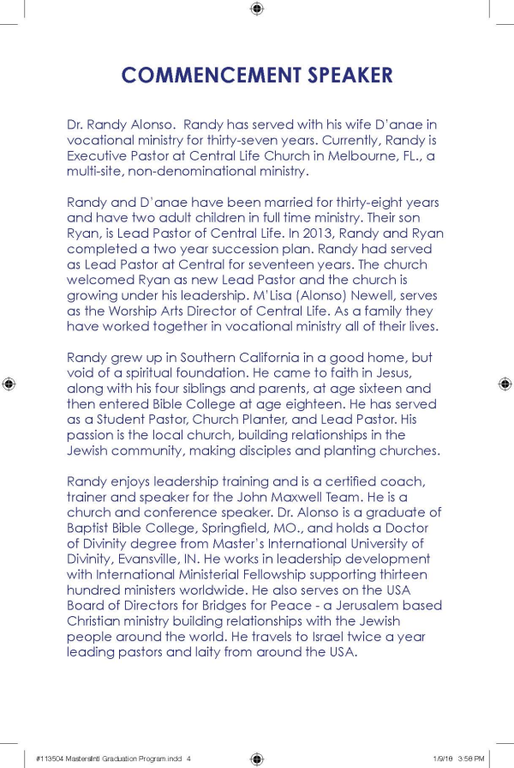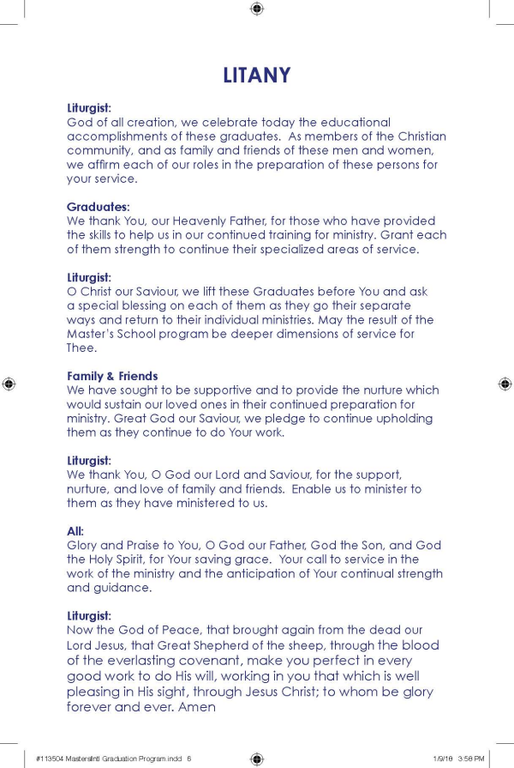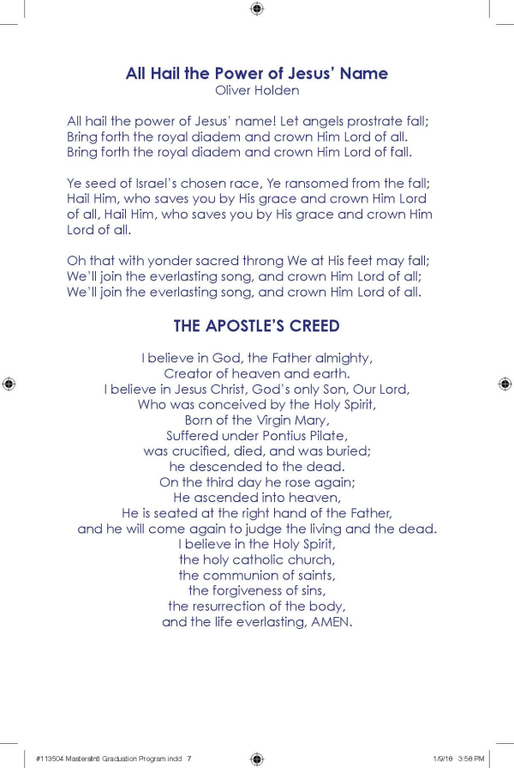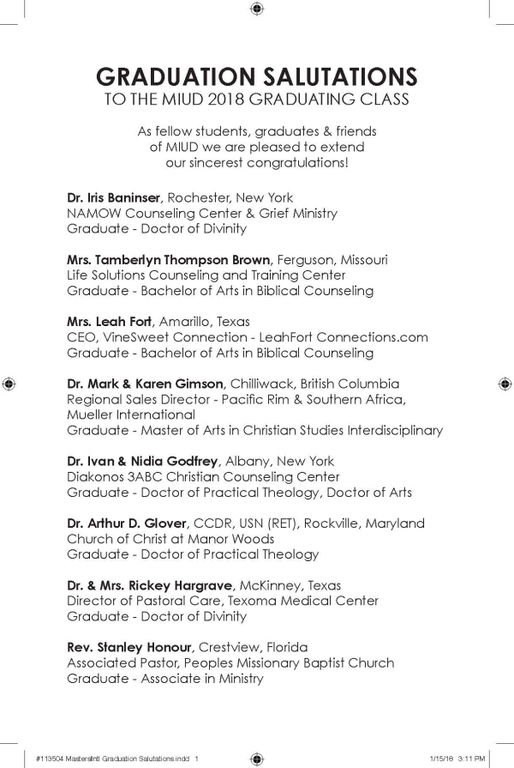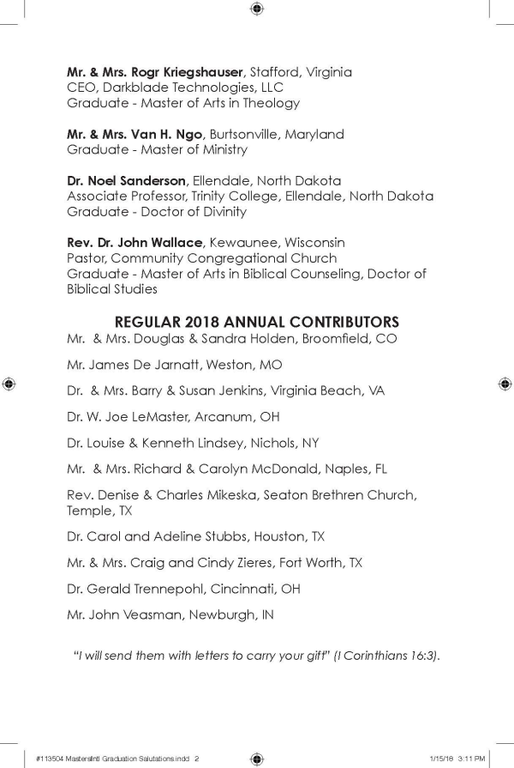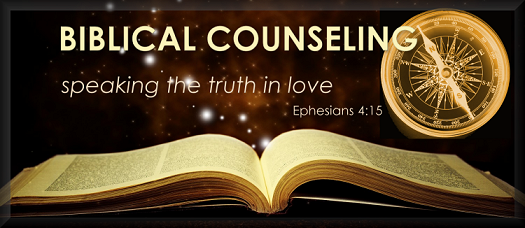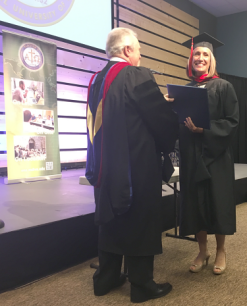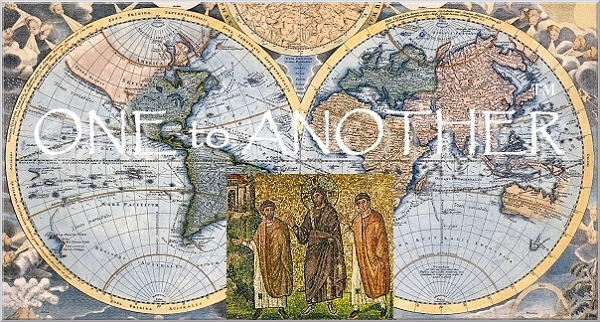MASTER'S International UNIVERSITY of Divinity
Bi-Monthly Information and Teaching Journal
ONE to ANOTHER ~ February 2018 - March 2018 ~ Volume IV ~ Issue 2
In This Issue
January 2018 Graduation | The Moral Difference Between Right & Wrong | Worldy Way of Thinking | The Holy Spirit Guides | Book
Review
Divine Appointments | The Truth About Late-Term Abortion | Biblical Creation Apologetics Degree Awarded
This Old House | Thoughts on Obeying God| Life Lessons | Great Words of the Christian Faith
Wednesday, February 14 - Thursday, March 29, 2018
CONGRATULATIONS TO THE JANUARY 27, 2018 ON SITE GRADUATES
Master's Event Center in Melbourne, Florida
- Stephen Curtis Atkins, Sr. - Bachelor of Arts
- Robert Critney, Jr. - Doctor of Practical Theology
- Noah Gyimah - Master of Christian Studies
- Ivan Godfrey - Doctor of Practical Theology
- Frank Thomas Lenihan - Doctor of Divinity
- Eric Gene Miller - Doctor of Practical Theology
- Richard McDonald - Doctor of Biblical Studies
- Andrew Salvatore Bonci - Doctor of Arts
- Van Hong Ngo - Master of Ministry
- Deborah White - Master of Arts in Biblical Creation Apologetics in partnership with the Institute for Creation Research, Dallas, TX
- Nidia Godfrey - Master of Business Administration on behalf of California Coast University, Santa Ana, CA
- Lucille Holder - Doctor of Biblical Studies
- Peggy K. Adegoke - Doctor of Biblical Studies
- Moses Ekhuemelo - Master of Ministry
Graduates pictured left to right beginning with the top row.
2018 GRADUATION AWARD RECIPIENTS
Award Photos Information and Navigation: Click the large photo above to view all and read captions.
Not pictured above: Jesse P. Waggoner, received the Outstanding Scholarship Award in abstention.
HONORABLE MENTION
Van Hong Ngo, Master of Ministry
In the early 1970's Van Hong Ngo escaped his war ravaged country on a perilous boat ride to an uncertain future. He and his wife became known as part of
"The Vietnamese Boat People." Speaking no English, this young Buddhist refugee made it to the United States with nothing but the hope of a better life.
On Saturday, January 27, 2018 Mr. Van Hong Ngo was awarded the Master of Ministry degree from MIUD. Against all odds, he had journeyed from darkness into light, and along the way, found not
only a better life, but life eternal through Jesus Christ his Lord!
The English language has not come easily, and he was given no special privilege in his program at MIUD. He never quit, he never complained, he simply trusted God and pushed ahead. We
honor Brother Van Hong Ngo!
Click the image below to enlarge and read the graduation program.
Click the image above to enlarge and read the graduation program.
Other Special Graduation Recognition: Scroll down to see Biblical Creation Apologetics degree award.
How Do Humans Beings Know the Moral Difference Between Right and Wrong? Natural Law and the Noahide.
Part IV
Continued from the previous
Journal.
Dennis D. Frey, M.Div., Th.D., President
NEW COURSE AVAILABLE - Interested in learning more about this subject? Master's offers a new Advanced Accelerated Course on this often negleced subject. The Laws of Universal Righteousness: Natural Law, the Noahide and the Torah LUR-1500-AOC
The purpose of this course is to address the fundamental question of how it is that human beings understand the moral difference between right and wrong, and why that understanding commands personal accountability.
Click here for information on signing up for this special four-week course.
IV. WHAT IS THE MECHANISM OF COMPREHENSION?
As stated previously, it is universally accepted among Christians and Jews that human beings are uniquely created in the "image of God." As it relates to human life this is the most fundamental premise of the Bible as established in the first chapter of the first Book.
"Then God said, 'Let Us make man in Our image, according to Our likeness; and let them rule over the fish of the sea and over the birds of the sky and over the cattle and over all the earth, and over every creeping thing that creeps on the earth.' God created man in His own image, in the image of God He created him; male and female He created them" (Genesis 1:26).
It is also universally understood by Christians and Jews that the image of God in mankind is not physical, but spiritual. As Jesus (the Incarnation) Himself affirmed, "God is spirit, and those who worship Him must worship in spirit and truth" (John 4:24).
God is a spirit, and a Person. We speak of the "Persons" of the Godhead, and accept that as Persons the Father, Son and Holy Spirit have personality. The word personality is a noun meaning "The complex of characteristics that distinguishes an individual; especially: the totality of an individual's behavioral and emotional characteristics; a set of distinctive traits and characteristics. 1
"Behavioral and emotional characteristics" can only be known by action, and action that is by choice. Action promoted other than by choice carries no real personality - true personality is only possible for a person.
What makes us most like the image of God is not that we have a spirit, but that we have a moral spirit. That is, a spirit capable of moral choice. Not just choice as in which color of socks to wear or to wear no socks, but moral choices or immoral choices.
The word "choose" is found in 71 verses in the Bible, the best known of which is probably Joshua's final appeal to Israel "choose for yourselves today whom you will serve" (Joshua 24:15).
The word "chose" is found in another 58 verses. In both a positive and negative way the word is employed to express man's freedom of will, even when man makes a choice to act against the very Creator who gave him freedom of will. For example, God speaking to Judah through the prophet Isaiah said "Instead they did what was evil in my sight and chose what did not please me" (Isaiah 66:4).
The mechanism of the comprehension of morality while innate is also willful. Genesis chapter three demonstrates this in the account of the fall. In that account the man and woman are capable of knowing right from wrong, and also capable of making a freewill choice based upon that knowledge.
The innate capacity to know moral truth, and then to willfully act upon it is the most defining characteristic of our person. One might also argue that it is the thing about us which is most like God. While we are physical creatures to be sure, and the body is sacred - so much so that it will be resurrected either for eternal life or eternal death (the second death, Revelation 21:8) it is not the body that make moral choices - it is the spirit or as it is so often define - the heart.
The mechanism of moral comprehension is the spiritual image of God within us - an image that is infinitely inferior, but sufficiently endowed so that we are in fact incapable of not knowing moral truth (however we may choose to act upon it). That is, of course, unless we are by some cause in the sight of God incapable.
To be continued...
1. https://www.merriam-webster.com/dictionary/personality
What is it that determines the worldly way of thinking?
Paul said it is “according to” or determined and controlled by “the prince of the power of the air, of the spirit that is now working in the sons of disobedience.” This worldly mindset is controlled by the devil himself. He gradually introduces an idea in a subtle or indirect way. The serpent asked Eve, “Indeed, has God said?” Adam and Eve had never questioned the truthfulness of God before. The serpent comes to Eve with his wily and stealthy question suggesting that God’s words were untrustworthy.
The most dramatic example is the situation described in Matthew 16. In Caesarea Philippi Peter makes his famous confession. Jesus asked, “Who do people say the Son of Man is?” Peter responded, “You are the Christ, the Son of the living God.” Jesus praised Peter for his answer and said, “flesh and blood did not reveal this to you, but my Father who is in heaven.” Jesus proceeded to tell of his upcoming arrest and crucifixion. Peter, taking Jesus aside, immediately objected and amazingly rebuked Him and said, “God forbid it, Lord! This shall never happen to You.” Our Lord quickly condemned Peter for querying His eternal mission, “Get behind Me, Satan! You are a stumbling block to Me; for you are not setting your mind on God’s interests, but man’s.”
Notice the contrast. The Father revealed to Peter who Jesus was. Satan was covertly behind Peter’s thinking when Peter took Jesus aside and rebuked Him. “Get behind Me, Satan” Jesus said. It was the devil insinuating doubts in Peters’ mind. The phrase “sons of disobedience” does not simply mean disobedient sons or children. Jesus used a similar expression when he said “You are of your father the devil, and you want to do the desires of your father” (John 8:44).
The idea is that disobedience is the distinctive characteristic of these children or sons. Disobedience is always the essential and primary issue that leads to people’s problems and difficulties in life. Disobedience is the main issue in Adam and Eve’s and our relationship to God. We deliberately rebel against God. Sin is not just something that is negative or the absence of good. The Bible’s teachings about sin are that it is positive, active and deliberate. It is a departure from obedience. Sin is not sickness. It is not low self-esteem. It is not that one has not realized his full potential and given more time will improve.
That is the idea promoted by the world. That is the reason discipline and punishment is considered cruel, and is a thing of the past. Man is essentially good and so we must be patient and lend a sympathetic ear. The result is a breakdown of discipline in every aspect of society and the home. Sin is man’s deliberate self-assertion. It is man setting himself up against his Creator.
Sin is man’s ambition to be God. Sin is religious. It is man denying he is created by God. Man is repulsed by the idea that he is a creature who is dependent upon a Being higher than himself. A Divine Person, who commands his obedience and worship, insults him. This is the reason for man’s atheism and his objection to God.
Thus man, to explain his origin, concocts the idea everything evolved. He invents a plethora of psychologies to explain his behaviors; all without reference to God.
The Holy Spirit Will Guide You
Read John 16:12-15
Some guidance is good; some guidance is not so good. A Baptist family had a family member die as their pastor was out of town. They went to the Methodist pastor and asked if he could do the service. The Methodist pastor sought guidance from his Bishop. He emailed the Bishop, “Is it permissible for me to bury a Baptist?” The Bishop emailed back, “Sure, bury all the Baptist you can.”
I would imagine that most Baptist would not appreciate that kind of guidance. In this article, we will discuss guidance that is always correct for it is the guidance of the Holy Spirit. It is a Biblical reality that …
I. The Holy Spirit will Guide Us
One of the glorious realities of the indwelling of the Holy Spirit in every believer (Rom. 8:8) is the fact that the Holy Spirit is available to guide us through life (vs. 14). Jesus, in describing the Holy Spirit to His disciples on the Thursday evening before Calvary, called the Holy Spirit the paraclete (Greek, John 14:16); that is the One who comes along side to help.
Jesus specifically declares that the Holy Spirit will guide us (John 16:13). Jesus did not say that He would compel us, or force us, or drive us; He will guide us.
This shows a working relationship between us and the Spirit of God. We can choose to follow His guidance or we can choose to make life decisions without Him. It is when we choose to make life decisions without Him that we get into trouble.
We face here several powerful truths. One of these is that God has an interest in the life decisions of His children because He loves us (John 3:16). Is it not a reality that loving parents want their children to make wise decisions? … and loving parents try to guide their children down that path of wisdom? … and loving parents are hurt when their children make unwise decision and suffer the consequences of those decisions? It is the same with our Heavenly Father.
We must remind ourselves that God cares about our everyday decisions because God loves us beyond words. He cares what house we buy. He cares where we go on vacation. He cares where our children go to school. He cares what job we take. He cares what we do with our time. He cares what doctor we have or what medical procedures we face. He cares what church we attend. He cares about our finances. He cares about our hobbies. He cares about our frustrations and our disappointments. The point is: If it matters to us, it matters to God because we matter to God.
We could be tempted to think that God is so involved with the events in Washington, or the Middle East, or Moscow that our puny decisions do not matter to Him. However, if we reason in that way we are wrong – He does care immensely! The Apostle Peter tells us to cast all of our anxieties upon Him because He cares for us (I Pet. 5:6-7). Jesus told His disciples, Your Heavenly Father knows what you need (Matt. 6:31-32). He notices even the smallest details.
Let us remember that the Holy Spirit will guide us into the truths regarding life’s decisions (John 16:13). Let us embrace Him in the decision making process and allow Him to guide us.
Another powerful reality in this vital process is:
II. The Holy Spirit is a Trustworthy Guide
Jesus referred to the Holy Spirit as the Spirit of Truth (John 16:13). He will lead us into truth and He will lead us on the basis of truth. This is the type of guide we can trust.
This is an important reality for we need reliable guidance in our decisions every day. The Holy Spirit will help us discern between what is true and what is not; what is wise and what is unwise; what is best and what is simply OK. It is our challenge to seek His discernment in all that we do and then to follow the Holy Spirit’s promptings.
This is the New Testament pattern and is well illustrated in the early church. When the church assembled as recorded in Acts 15 to decide what requirements to expect from Gentile believers, they prefaced their conclusions with these words, For it seemed good to the Holy Spirit and to us to lay upon you no greater burden than these necessary things (Acts 15:28). They were led by the Holy Spirit in these decisions.
When Peter was invited to the home of the Gentile Cornelius, Peter testified that he was led of the Holy Spirit to accept that invitation (Acts 1:12). Thus, the gospel was preached in that Gentile home.
The Apostle Paul spoke of that same type of Holy Spirit guidance on his missionary journeys. Paul, for example, contemplated a mission to Asia, but was forbidden by the Holy Spirit at that time (Acts 16:6).
Jesus promised that the Holy Spirit will guide us (John 16:13). Thus our decisions should not only seem good to us but also to the Holy Spirit. Let us be open and sensitive to His promptings.
Paul wrote to the church at Rome, For as many as are led by the Spirit of God, they are the sons of God (Rom. 8:14). Paul wrote to the churches of Galatia, If ye be led by the Spirit, ye are not under the law (Gal. 5:18).
The Holy Spirit is our Guide. The Holy Spirit is a trustworthy Guide. Are we willing to cast all of our anxiety upon Him during the coming week?
All your anxiety, all your care,
Bring to the mercy seat; leave it there.
Never a burden He cannot bear;
Never a friend like Jesus!
Book Review:
Short Stories by Jesus: The Enigmatic Parables of a Controversial Rabbi
by Amy-Jill Levine
Cheryl A. Durham, M.Min., Ph.D., Dean of Students
Amy-Jill Levine is University Professor of New Testament and Jewish Studies, Mary Jane Werthan Professor of Jewish Studies, and Professor of New Testament Studies at Vanderbilt Divinity School and College of Arts and Sciences. She is the author of The Misunderstood Jew, and one of the authors/editors of The Jewish Annotated New Testament.
In all of her works, it seems that her goals are the same; that Jesus in the Gospels and the other New Testament writings ought to be understood within the Jewish contexts in which they were written. It is also important to Dr. Levine that those who believe that they are already familiar with the text, be careful not to misunderstand it through later interpretive eyes that had other motives for interpreting the text without a Jewish context.
In this particular volume, Short Stories by Jesus: The Enigmatic Parables of a Controversial Rabbi, Dr. Levine examines Jesus’ parables in the New Testament Gospels. She opines that the questions one ought to ask of the parables are “How do we hear the parables through an imagined set of first-century Jewish ears, and then how do we translate them so that they can be heard still speaking?” (Pp.19-20)[1]
Keeping these themes in mind, Dr. Levine parses through several parables and shows the reader not only how the traditional Christian reading is often read, but also gives us reasons why that particular interpreter may have chosen to interpret that way. However, she maintains that ‘domestication’ of the parables over thousands of years with constant re-application of the text, while not bad in and of itself, has often taken what should have been a provocation for the reader’s self-examination and turned it into parables that teach prejudice against others.
In Chapters 1-9, we see various parables. In each one, Dr. Levine gives us some background information that challenges the traditional reading of the story in such a way as to open the reader’s eyes to a new slant on the story. This slant often takes the reader far afield from their traditional understanding. The author states that while she does not intend to undo later interpretations, she wants to add another layer (p.20) that will provoke action from the reader to take in the message of the parable as the original audience would have understood it and which Jesus intended for heart change. Much of the content accomplish that goal. A sincere reader would pause to ponder the various twists and turns to the parable within a context that makes the story more provocative, challenging him or her to change.
I would recommend this to students who are interested in an authentic context within which to find nuanced meaning in the text. Many students of the Bible have their own ‘traditions’ in textual interpretation that often get in the way of the truly colorful expression that the world of Jesus and His disciples display in the New Testament texts.
This book gives more accurate cultural insights than one gets by merely reading the English translation of the text.
[1] Levine, Amy-Jill. Short Stories by Jesus: The Enigmatic Parables of a Controversial Rabbi (pp. 19-20). HarperCollins. Kindle Edition.
Divine Appointments
Part III
Continued from previous edition.
David W. Anderson, Ed.D., D.B.S.; Program Developer and Director for the Master of Arts Certificate in Disabilities Ministry
Continued from previous edition.
Christian calling and divine appointments
Living in dynamic relationship with God requires a complete surrendering of our lives to God (cf. Hillman, 2008). Guinness (1998) wrote, “We are not primarily called to do something or go somewhere: we are called to Someone . . . to God” (p. 23). God’s call is his claim, not just on what we do for a living, but on our lives. And within that call, God will have divine appointments for each Christian, to which we must develop an openness.
Since our primary call is to glorify God, the good works of service and compassion we have been created to do become a visible attestation to the reality of our salvation. Because we are God’s workmanship, our good works are tied to his design of each of us, and provide opportunities to “join [Jesus] in the work he does, and the good work he has gotten ready for us to do” (Ephesians 2:8–10, MSG). This provides multiple opportunities for divine appointments and requires being open to, and expecting, divine appointments throughout our life. These divine appointments are tied to the work of the Holy Spirit in our lives, allowing us to minister to others in Jesus’ name. But they are also a means by which we are transformed into the likeness of Jesus (Romans 8:29; 2 Corinthians 3:18) by developing such graces as compassion, kindness, humility, gentleness, and patience (Colossians 3:12).
Hillman described the Christian’s call as “the umbrella under which we function as believers” (2008, p. 198). This functional call entails how we relate to our family; serve our neighbors in Christian love; function in the local body of Christ; and serve the greater society in stewardship and mission. Everything that brings us into relationship with others, including responding to those divine appointments God has for us, is a part of our call as Christians.
God’s call includes his positioning us in life, giving us the location and context in which to serve him with total commitment (Zacharias, 2007). Maintaining an awareness that God has divine appointments for us helps us to be more intentional about this commitment. Wherever we live, work, or play is where God has called us to represent, encourage, and further his kingdom. To enable us to do this, God has gifted us — as preachers, healers, artists, mechanics, merchants, teachers, homemakers, etc. God’s design of each person includes talents, interests, aptitudes, abilities, desires, and experiences which enable us to fulfill our calling to “be” Christ in the world, and bring us into contact with potential divine appointments.
To be continued...
REFERENCES:
Graham, D. (2003). Teaching redemptively: Bringing race and truth into your classroom. Colorado Springs, CO: Purposeful Design Publications.
Guinness, O. (1998). The call: Finding and fulfilling the central purpose of your life. Nashville, TN: Word Publishing.
Hartshaw, J. R. (2010). Prophetic voices, silent words: The prophetic role of persons with profound intellectual disabilities in contemporary Christianity. Practical Theology, 3 (3), 311–329.
Hillman, G. (2008) Calling and spiritual formation. In P. Pettit (Ed.), Foundations of spiritual formation: A community approach to becoming like Christ (pp. 195–216). Grand Rapids, MI: Kregel Publications.
McNair, J. (2009). The church and disability: The weblog disabled Christianity. CreateSpace Independent Publishing Platform.
Miller, D. L. (2009). LifeWork: A biblical theology for what you do every day. Seattle, WA: YWAM Publishing.
Ortberg, J. (2005). God is closer than you think. NY: MSF Books.
Ortlund, R. (2014). The gospel: How the church portrays the beauty of Christ. Wheaton, ILL: Crossway.
Snyder, H. A. (2004). The community of the king. Downers Grove, IL: InterVarsity Press.
Zacharias, R. (2007). The grand weaver: How God shapes us through the events of our lives. Grand Rapids, MI: Zondervan.
The Truth About Late-Term Abortion
Bradley Mattes, M.B.S. MIUD Adjunct Faculty; President and CEO of Life Issues Institute, Inc.
The Senate is expected to vote Monday, January 30, 2018 on the Pain-Capable Unborn Child Protection Act which would prohibit abortion after five months (20 weeks) – a point by which a baby can feel the excruciating pain of the abortion procedure.
Planned Parenthood’s extreme position on abortion is reflected in their opposition to the bill. Its chief medical officer, Raegan McDonald-Mosley, tweeted that the legislation “is a ‘solution’ in search of a problem.”
Pro-abortion advocates claim late-term abortions are very rare and occur when there is a severe physical anomaly with the unborn child or a serious medial threat to the mother.
Yet, the evidence shows otherwise.
Regardless of the reason given for abortion and the point in pregnancy when the child is killed, we take a stand for life. Even so, we must debunk their myth that persuades many people to support abortion.
An August 2011 article on George Tiller by pro-abortion advocate Carole Jeffe painted the notorious late-term abortionist as a heroic advocate for women in crisis. Fifteen times she stated his abortions were done for “fetal indication” pregnancies (anomalies with the baby).
But during a speech at the 1995 National Abortion Convention in New Orleans, Tiller had already put to bed the misconception that late-term abortions were done for only extreme cases. “We have some experience with late terminations; about 10,000 patients between 24 and 36 weeks and something like 800 fetal anomalies between 26 and 36 weeks in the past 5 years.”
After the Kansas State Board of Healing Arts filed a petition against George Tiller in December 2008 for 11 counts of performing late-term abortions in violation of state law, he decided to hang up his deadly tools of the trade.
A feminist blog reported that Tiller had informed fellow abortionist LeRoy Carhart that he would soon retire. It has been speculated that Tiller wanted to avoid the same disciplinary outcome as his colleague Ann Kristin Neuhaus whose medical license was revoked. This conversation reportedly occurred a week before Tiller was [tragically] gunned down in his church.
Tiller isn’t the only abortionist to reveal the reasons for late abortion. Martin Haskell, who claims to have developed the partial-birth abortion procedure, told American Medical News in a 1993 interview, “I’ll be quite frank: most of my abortions are elective in that 20-24 week range…. In my particular case, probably 20% are for genetic reasons. And the other 80% are purely elective…”
Priests for Life and Abortion Free New Mexico in a recent undercover campaign phoned several abortion facilities. The young woman caller stated she was at or over 20 weeks and, without fail, was told she could have an abortion for any reason, as long as she could pay the bill.
The reasons why women obtain late-term abortions may surprise you. Elizabeth Ann M. Johnson, MD authored an analysis of research seeking why women have late-term abortions. Data on over 400 women 20 weeks or more into pregnancy was collected by interviews and questionnaires. The authors of the study found that the wider “data suggests that most women seeking later terminations are not doing so for reasons of fetal anomaly or life endangerment.”
Dr. Johnson wrote, “…most late-term abortions are performed because of a delay in pregnancy diagnosis and for reasons similar to those given by first-trimester abortion patients: financial stressors, relationship problems, education concerns or parenting challenges.”
Contrary to the facade created by pro-abortion advocates and politicians, women are not seeking late-term abortions in response to rare, dire circumstances. The Pain-Capable Unborn Child Protection act is an essential tool to protect preborn children and their mothers from the abortion industry.
Please contact your senators today. Ask them to support this life-saving legislation.
Biblical Creation Apologetics Combination Degree Program
James J.S. Johnson, Th.D., J.D., MIUD Board of Advisors,
Chief Academic Officer, The Institute for Creation Research
DEBORAH WHITE, Sarasota, FL, was awarded the Master of Arts in Biblical Creation Apologetics in partnership with the Institute for Creation Research, Dallas, TX at the MIUD graduation event in Melbourne, FL January 27, 2018. CONGRATULATIONS!
Mrs. White is a high school science teacher at Sarasota Christian School, and holds a Bachelor of Science degree in Marine Biology from the State University of New York at Stonybrook.
On January 27, 2018 Deborah White was awarded the Master of Arts in Biblical Creation Apologetics in partnership with the Institute for Creation Research, Dallas, TX.
On that ocassion the following accolades were read:
____________
Dear Dr. Frey,
Debbie White is possessed of a clear and intelligent mind. Her answers to scientific questions are clear and crisp, yet they include all aspects of the question in the production of an answer. Her differentiation between what some call “science” and what we at ICR would call “true science” is phenomenal. Her emphasis on “context” in Scripture is decidedly “on target!” She exhibits talent for summarization, yet no vital details suffer omission. Apart from Scripture, Debbie White is my best read of the day.
Heartily in Christ,
Gene L. Jeffries, B.A., M.Div., Th.D.
Master Faculty
School of Biblical Apologetics
Institute for Creation Research
Dallas, Texas 75229
____________
Dear Dr. Frey
Please relate to Debbie White, ICR’s cordial congratulations, on her completion of her Master’s degree program, and especially for her Christian scholarship demonstrated in the course that she took via the Institute for Creation Research. Dr. Gene Jeffries, the ICR faculty primarily responsible for reviewing her work, had only the highest commendations for Debbie White’s work — noting that she is obviously a teacher herself. Always displaying intelligence and effective communications skills, she routinely expressed discernment in her studies, such as while analyzing the difference between the secular world’s “science" so-called (as Paul puts it in 1st Timothy 6:20) and true science, informed by Biblical revelation. For example, her analysis of radiometric dating problems included her recognition that secular-minded speculations exhibit spiritual blindness and a willing ignorance regarding the actual facts, revealing that unbelievers choose to reject true information when it clashes with assumptions they defend in order to rationalize ungodly lifestyles and attitudes. In other words, Debbie White understands the core issues, carefully deflecting deceptive distractions, as her careful and capable writings show her understanding of Scripture and Scripture-informed studies of God’s creation. Reverence is all-too-often in short supply, nowadays, among many students — but not so in her godly scholarship. It is with a hearty affirmation that the Institute for Creation Research commends Debbie White, a Christian learner and teacher, on the occasion of her graduation. May her tribe increase!
James J. S. Johnson
Chief academic officer & associate professor of apologetics
INSTITUTE FOR CREATION RESEARCH
School of Biblical Apologetics
____________
Click for more information on this unique program.
Many things can be said about the place in which we live. Our house is a place to dwell, to sit down, to abide, to inhabit, and to remain, just to list a few. The dwelling may be constructed of wood or brick, or other materials. In times past, and even today in remote areas of the world, even mud or sod might serve as the construction material.
The house in the picture above obviously was constructed of wood. It was never meant to be an elaborate, palatial estate. It was simply and compactly built to serve a family as a dwelling place during a period of their lifetime. It most likely served the family very well. They inhabited the structure, settled down there, and made the house a home.
As with any building, time took its toll on the house, and deterioration began. Repairs would be necessary if the house was to remain livable, a place where folks might still abide in comfort and safety. As the deterioration progresses the roof leaks, floor boards begin to creak, the cold winter wind howls through the windows which no longer maintain a tight seal.
Eventually, the house becomes inhabitable, and beyond reasonable repair. So, the family leaves this home behind and settles into a more comfortable, modern efficient house. The old house continues to experience a complete collapse.
Constant caring for, and keeping our house in good condition is essential to prolonging the life of the house. In the same, way, we are charged with maintaining our bodies which are the dwelling place of the Spirit.
The Apostle Paul speaks to this in his first letter to the church in Corinth when he writes (vss. 16-17):
"Do you not know that you are God's temple and that God's Spirit dwells in you? If anyone destroys God's temple, God will destroy him. For God's temple is holy, and you are that temple."
And his message in Ephesians 2:19-22 where he says:
"So then you are no longer strangers and aliens, but you are fellow citizens with the saints and members of the household of God, built on the foundation of the apostles and prophets, Christ Jesus himself being the cornerstone, in whom the whole structure, being joined together, grows into a holy temple in the Lord. In him you also are being built together into a dwelling place for God by the Spirit."
When we allow sin to enter into our lives, inviting it to dwell in our temple, the temple begins to deteriorate much like the material house we built. We sometimes offer a seemingly casual invitation to the enemy to come visit a spell. He is not satisfied with a one night sleepover. His aim is to become a permanent resident to kill and destroy any evidence of God and His Holy Spirit whose name is on the deed to the house. When we allow that to happen the house will fall down around us.
The instructions Paul writes to the church in Rome states clearly how we can keep our house in good repair when he says:
I appeal to you therefore, brothers, by the mercies of God, to present your bodies as a living sacrifice, holy and acceptable to God, which is your spiritual worship. Do not be conformed to this world, but be transformed by the renewal of your mind, that by testing you may discern what is the will of God, what is good and acceptable and perfect. --- Romans 12:1-2
Constant renovation is necessary when we allow sin to overtake the temple. Transformation and the renewing of the mind, and of the heart allows a spanking new clean place for the Spirit to dwell within!
Sinai Speaks: A Daily Devotional for Christians from the Torah
Available from Master's Online Bookstore.
James B. Solberg, M.Div., D.D.,
MIUD Adjunct Faculty; and member of the MIUD Board of Directors; U.S.A. National Director, Bridges for Peace International
THOUGHTS ON OBEYING GOD
From Sinai Speaks
"Then the LORD said to Moses, 'Go in to Pharaoh, for I have hardened his heart and the heart of his servants, that I may show these signs of mine among them, and that you may tell in the hearing of your son and of your grandson how I have dealt harshly with the Egyptians and what signs I have done among them, that you may know that I am the LORD'” (Exodus 10:1-2).
Both Thomas Jefferson and Benjamin Franklin are credited with the quote “Never put off until tomorrow what you can do today.” Beginning with the sixth plague, and repeated again for plagues eight, nine, and ten we read that the LORD hardened Pharaoh’s heart. Both Christian and Jewish scholars debate exactly what it means that the Lord hardened his heart and how this interacts with free will, but one thing is clear. After repeatedly denying the Lord’s will, at some point Pharaoh lost the ability to change his mind. He was now fixed in his attitude and belief, and nothing would change it or him.
At this point, Pharaoh had put off his decision too long. Although we would all chose to identify with Moses and Aaron throughout these encounters with Pharaoh, the truth is we may often respond more like Pharaoh. When we feel that the Lord is asking us to do something, or to help someone, do we procrastinate? Should we have a sign above our door that says: “Tomorrow Lord, tomorrow I will do what you ask.”
When will we begin that new habit of more time in prayer or study? When will we start on the new Scripture memorization program? When we will break through and join that small group or offer to teach Sunday School?
You may think that Pharaoh had two advantages over us. First, he had some pretty clear signs that God Almighty was behind this request, and second He was being asked repeatedly. Yet he said no, and eventually lost his ability to say yes.
As Bible-believing Christians, we have two huge advantages over Pharaoh. We have the lessons of Scripture, and God’s Spirit at work within us. Let’s not make the same mistake Pharaoh did. Today, let us reflect on what the Lord may be asking us to do, and let us ask God for the grace to not put off until tomorrow what can be done today.
May our example for our children and grandchildren be that of obeying the Lord and seeing His blessings.
Prayer: Lord, today we ask You to show us clearly what you are asking us to do, and to give us the grace to respond immediately with “yes.”Give us discernment to hear You clearly and never mistake Your voice for another. Let us trust that You have blessings ahead when we obey and follow. Amen.
What to Do When You Rediscover the Bible for Yourself - Nehemiah 8-10.
A chapter from his new book Life Lessons from Ancient Prophets.
Howard Eyrich, Th.M., D.Min, Author; ACBC Fellow; MIUD Adjunct Professor; and member of the MIUD Board of Directors.
There are many lessons in the book of Nehemiah applicable to us in the 21st Century that have been applicable for the centuries since the book was written. Some eight or ten years ago our church launched into a building program under the rubric “For Coming Generations.” The expansion was particularly focused on children and youth, and preparing them to periodically rebuild the walls. Our Pastor, Dr. Harry Reeder, preached a series from Nehemiah to stir the hearts of the congregation to get involved in building the wall (the necessary buildings) to disciple the coming generations for their challenges. He was not the first pastor to motivate folks from Nehemiah in a building campaign.
If you are a reader of Christian writers addressing the subject of leadership, you have encountered Nehemiah in their discussions. For example, Charles Swindoll, encouraging everyday believers to be leaders lists seven lessons.
- A passion for the project (exemplified by enthusiasm, drive, determination and creativity).
- Ability to motivate people (exemplified in articulating goals succinctly).
- An unswerving confidence in God (exemplified in by the journal of Nehemiah’s prayers).
- A resilience and patience through opposition (exemplified in dealing with critics).
- A practical balanced grip on reality (exemplified by his directing a “trowel and sword” approach to ensuring safety as well as posting guards).
- A willingness to be a hard worker and remain unselfish (exemplified in his feeding folks at his own expense).
- A discipline to finish the job (exemplified in focusing on essentials necessary to get the job done and not on perfectionistic details). 1
We are not going to work through the first five chapters. These are exciting and instructive as we learn why Nehemiah concludes that that good hand of God was upon me (2:18) and we observe the product of that “good hand” in courage, boldness, leadership, organization, etc.
We will pick up with chapter six which sees the completion of the wall project. Chapter seven records actions to secure the city and “Then my God put it into my heart to assemble the nobles, the officials and the people to be enrolled by genealogies” (7:5 NASB) and this leads to organizing the people accordingly and by the seventh month there they were settled in their cities (7:73).
There is an interesting and unexpected progression displayed for us in this historical occasion. It is interesting for two reasons. First, the organized dynamics of the occasion of building the wall leads to an interest in the book of the law of Moses (8:1 NASB). Nehemiah’s leadership and the completion of the job under duress inspired the people to want to look more closely at the BOOK. And, secondly because of the progression of the response to the Word. The progression is not what we would expect as we shall observe.
Upon the completion of building the wall, Nehemiah and Ezra gather with the people for a town meeting in the square in front of the Water Gate. Ezra stands in a specially constructed pulpit raised above the people (8:5) and reads from the book of the law (the Pentateuch) of Moses. As we read through this passage we discover that not only did Ezra read the Word, but the crowd was organized in groups for Bible study so that what was read was taught and explored
If we had the security footage to review, we would see Ezra reading a passage, followed by organizing into groups, and then instructing the study leaders to lead a discussion as to the meaning and application (8:8) of the passage just read. Then, after probably 20-30 minutes, Ezra called the group to order and read again, which was followed by instruction/discussion. This exposure to the Word led to deep sorrow and weeping (8:9).
What we have observed on our imaginary security footage leads us now to follow the progression of this wonderful historic record. There are six lessons for us to explore in this account.
First, do not focus on grieving and regretting the past (8:9). Yes, when we are freshly convicted upon our return to the Word after neglecting it for some time, we should repent. But, here is an important lesson. Psalm 37:8b says “Do not fret, it leads only to evil doing.” Nehemiah calls them to celebration and instructs them to remember “…the joy of the Lord is your strength” (8:10) “…because they understood the words which had been made known to them” (8:12).
When we come to a place of recognizing our sin and reckoning with it through repentance we must be cautious of our Enemy turning our sorrow into more sorrow (fretting over our past). We need to celebrate the faithfulness of the Lord who brought us to a return to the Word and rejoice in His love and forgiveness.
Editor's note: If you are like the editor, you want to continue reading. So, be on the lookout for more when Dr. Eyrich's latest book Life Lessons from Ancient Prophets is published later this winter or early spring. We will keep you posted.
1. http://www.insight.org/resources/article-library/individual/seven-leadership-lessons-that-apply-to-you Cited 1/26/18. (Although taken directly from Swindoll, I have rearranged elements of his material.
RESURRECTION - One of the Great Words of the Christian Faith
Dennis D. Frey, M.Div., Th.D., President
RESURRECTION
Great Words of the Christian Faith
WORD: Resurrection
MEMORY VERSE: "Blessed be the God and Father of our Lord Jesus Christ, which according to his abundant mercy hath begotten us again unto a lively hope by the resurrection of Jesus Christ from the dead" (I Peter 1:3 KJV).
HOW FIRM A FOUNDATION
Attributed to: George Keith (c. 1787); R. Keen (c. 1787)
How firm a foundation, ye saints of the Lord,
Is laid for your faith in His excellent Word!
What more can He say than to you He hath said,
You, who unto Jesus for refuge have fled?
The Resurrection
Of Jesus: The Biblical record and historical fact of the literal bodily appearance of Jesus of Nazareth following His death and burial, providing irrefutable proof His Messianic claims, and total hope for the resurrection of the born-again.
General: The Biblical teaching that the eternal spirit and physical body of all human beings will ultimately be reunited to unending life at the close of the age. Some to everlasting life and some to everlasting torment.
Grk. Anastasis | an-as'-tas-is
a raising up, rising (e.g. from a seat)
to stand up
a rising from the dead
that of Christ
that of all men at the end of this present age
the resurrection of certain ones history who were restored to life (Hebrews 11:35)
Nave’s Topical Bible General scriptures concerning:
Job 14:12-15; 19:25-27; Psalms 16:9,10; 17:15; 49:15; Isaiah 25:8; 26:19; Ezekiel 37:1-14; Daniel 12:2,3,13; Hosea 13:14; Matthew 22:23-32; 24:31; 25:1-13; 27:52,53; Mark 12:18-27; Luke 14:14; 20:27-38; John 5:21,25,28,29; 6:39,40,44,54; 11:23-25; 14:19; Acts 2:26-31; 4:1,2; 17:18,32; 23:6,8; 24:14,15; 26:6-8; Romans 4:16-21; 8:10,11,19,21-23; 1 Corinthians 6:14; 15:12-32,35-57; 2 Corinthians 4:14; 5:1-5; Philippians 3:10,11,21; 1 Thessalonians 4:14,16; 2 Timothy 1:10; 2:18; Hebrews 6:2; 11:19,35; Revelation 1:18; 20:4-6,13.
he first reference to resurrection in the New Testament:
"On that day some Sadducees (who say there is no resurrection) came to Jesus and questioned Him" (Matthew 22:23 KJV).
The last reference to resurrection in the New Testament:
"Blessed and holy is he that hath part in the first resurrection: on such the second death hath no power, but they shall be priests of God and of Christ, and shall reign with him a thousand years"(Revelation 20:6 KJV).
Copyright © Notice ~ Articles may be freely shared with appropriate credit, but may not be otherwise used without the consent of the author.



